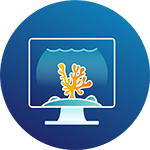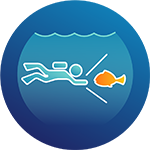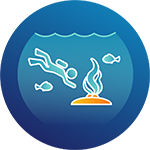
Marine Biology
Life in the Ocean
Among all the ocean sciences, marine biology is one of the most popular among high school students. We are not sure if this is because of all the ocean sciences, it is the one typically offered at the high school level, or because students think being a marine biologist means you get to spend your days frolicking with dolphins. We don’t want to put an end to anyone’s dreams, but there is a greater chance you will end up dissecting a dolphin rather than swimming with one. So, if still interested, read on!
To put it as simply as possible, marine biology is the study of life in the oceans and other saltwater environments.[1] It can range from the study of microscopic plankton to massive whales. Although closely related, marine biology should not be confused with oceanography. While marine biologists study marine organisms’ characteristics, physiology, life history, and interactions between marine animals, oceanographers study ocean systems’ chemistry, physics, and geology and how marine organisms shape those systems.[2]
With eighty percent of all life on Earth found in the ocean, it should come as no surprise that the field of marine biology can vary wildly depending on your particular interests. That’s why most marine biologists choose an area of specialization based on a specific species, organism, behavior, technique, or ecosystem.[3] Some marine biologists may focus on a single species (like whale sharks) for their entire career, while others may study all sharks or sharks native to a particular climate or area. Specific areas of specialization in marine biology include phycology, microbiology, ichthyology, invertebrate zoology, evolutionary biology, computational biology, systems biology, marine mammalogy, fishery biology, marine biotechnology, quantitative biology, genomics, or marine ecology. Job titles for marine biologists include microbiologist, zoologist, fish and wildlife biologist, aquatic biologist, conservation biologist, marine biotechnologist, and many others.[4]
…
Citations
- What is Marine Biology?, MarineBio Conservation Society.
- What’s the Difference between Oceanography and Marine Biology?, Florida Institute of Technology.
- Marine Careers, A Sea Grant Guide to Ocean Opportunities.
- Career Options in Marine Biology, Florida Institute of Technology.

The Path to Becoming a Marine Biologist
From High School to Your First Job
Build a Solid Academic Foundation
Basics:
Take all available STEM-related courses (biology, physics, chemistry, computer science, algebra, geometry, calculus) offered at your high school. Take all these classes at the most advanced level possible (honors, AP). This will help you build your knowledge base in scientific theory and concepts.
Recommended:
If not available at your high school, try and take biology-related (zoology, biochemistry, microbiology, evolutionary biology, genomics, molecular biology), ocean-related (marine biology, marine microbiology, oceanography), and mathematics-related (probability and statistics) classes offered online.
Keep in Mind:
Gain lab work experience through a research internship. Learn how to write for a scientific and non-scientific audience. The ability to communicate in writing cannot be overstated. Given the international nature of scientific collaboration, become fluent in a foreign language. Be a voracious reader.
Dive In!
And become an expert
![]()
Peruse our library of must-read books
![]()
Thumb through a scientific publication
Take an online course
![]()
Watch an interesting video
![]()
Check out these great websites
Get a

jump on your Academic career
There’s no substitute for experience.
We have compiled a database of thousands of internships, research opportunities, academic programs and specialized training programs so you can get a jump on your academic career.
Internships
Research
Academic Training Programs
And if you need support to fulfill your dreams and ambitions, our searchable database has plenty of scholarship opportunities as well as programs designed to increase diversity in the sciences.
Scholarships
Diversity, Equity & Inclusion
Need Help Finding Your Opportunity?
Our video tutorials explain the ins and outs of landing a great internship, research project or training program.
Make all the right moves
Advice from those who know
Maintain an excellent GPA, especially in the sciences
Have some work experience on your resume
Obtain lab experience and become familiar with lab instrumentation
Attend professional conferences and marine biology seminars
Present your research at student research colloquiums
Build experience through internships or as an undergraduate researcher
Join professional societies and organizations
Stay current by reading professional and scientific journals
Learn about current research projects
What degree is right for you?

Bachelor’s Degree
A bachelor’s degree is required for all entry-level jobs, but advancement is limited. You should obtain a degree in biology with a concentration in either marine biology or oceanography or something closely related (hydrology) or complimentary (microbiology, biochemistry, biogeochemistry). Familiarity with lab techniques, computer modeling, and the use of scientific instrumentation is essential.
Master’s Degree
A master’s degree is recommended as this is where, depending on the program, you will be able to pursue further specialization in marine biology. A master’s degree will open up more employment opportunities with both federal and state government agencies as well as with various firms in the private sector. In a master’s program, you will learn the theory and the practice of marine biology in addition to having the opportunity to engage in fieldwork.
Doctorate
A doctoral degree and most likely, post-doctoral studies are required if you want to have a career in academia. Senior positions in the public and private sector such as microbiologist, botanist, zoologist, fish and wildlife biologist, aquatic biologist, conservation biologist, marine mammologist, marine biotechnologist, and aquatic animal veterinarian may require that you have a doctoral (or veterinarian) degree. This is also true for high-level positions with nongovernmental and nonprofit organizations.
10 Schools With Excellent Marine Biology Programs
Want to see the full list of colleges and universities with degree offerings or relevant courses?
Marine Biology
Boston University
Biology – Marine Biology Concentration
Duke University
Ocean Science Marine Biology Area of Emphasis
Skidway Institute of Oceanography, University of Georgia
Marine Biology
Hopkins Marine Station, Stanford University
Marine Biology
Oregon Institute of Marine Biology, University of Oregon
Marine Biology
University of Rhode Island
Marine Biology
Scripps Institution of Oceanography, University of California San Diego
Marine Biology
University of Hawaii at Manoa
Marine Biology & Ecology
Rosenstiel School of Marine & Atmospheric Science, University of Miami
Marine Science
San Jose State University, Moss Landing Marine Laboratories
![]()
Tip 1
Marine biology is an extremely competitive field. Develop that something extra to give yourself an edge. Volunteer at a nature center, zoo, animal shelter, aquarium, or vet clinic to show you have more than just book smarts.
![]()
Tip 2
As soon as possible, try and get out in the field to obtain some real-world experience and perspective. There are hundreds of internships, fellowships, and research opportunities available to students interested in ocean science.
![]()
Tip 3
Try and find a professor in the biology department that has an interest in the ocean and see if they would be willing to mentor you. Maintain a good relationship as they can help with getting a job upon degree completion.
Have familiarity with one or more of the following areas

Science communication

Artificial intelligence

Underwater photography and imagery

Scientific diving

Marine Geographic Information Systems

Oceanographic sampling

Systems and statistical modeling

Marine field data collection and analysis

Computer programming languages

Bioacoustics
Typical Job Functions of a Marine Biologist
Here are some of the interesting things you could be doing.
Researching the relationships and behavior among marine organisms.
Analyzing the evolution and distribution of marine organisms.
Analyzing the health of various components of the marine environment.
Assisting with rebuilding damaged marine ecosystems.
Using computer modeling to make predictions about the marine ecosystem.
Analyzing lab samples and developing new research theories.
Analyzing specimens and samples of unknown species and diseases.
Mapping the distribution, ranges, or movements of marine populations.
Teaching policy, planning, and management of marine activities.
There’s an Ocean of Possibilities
For anyone with a love of the ocean, marine biology is a fantastic career choice. There are so many interesting areas within the field of marine biology that there is something for everyone. But just remember, it’s not all about (or hardly ever) frolicking with the dolphins, so make sure you have realistic expectations for any marine biology job.
Common employers include:
Federal Government Agencies
- U.S. Environmental Protection Agency
- National Oceanic and Atmospheric Administration
- National Science Foundation
- U.S. Park Service
- Natural Resources Conservation Service
- Bureau of Ocean Energy Management
State Government Agencies
- Environmental Protection
- Fish and Wildlife
Military
- U.S. Navy
- U.S. Coast Guard
- National Defense Research
Private Industry
- Aquaculture
- Fisheries
- Aquariums
- Zoos
- Wildlife Sanctuaries
- Aquatic Preserves
- Pharmaceuticals
- Biotechnology
- Environmental Consulting
- Offshore Renewable Energy
- Private Laboratories
- Tourism
Non-Governmental Organizations
- Environmental Organizations
- Conservation Organizations
Academia
- Universities
- Research Institutions
Start your career search with our extensive list of employment websites.
